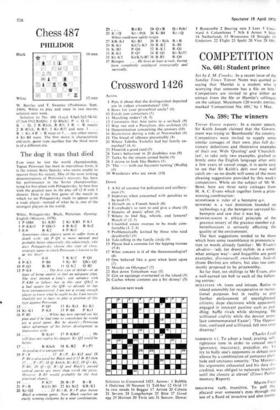Chess 487
PHILIDOR
W. Barclay and T. Sweeney (Problemist, Sept. 1969). White to play and mate in two moves; solution next week.
Solution to No. 486 (Loyd 8/6p1/5p2/5K1k/ r7/3n4/5N2/R1Q5): 1 Q-R6ch!, P x Q (1 . . . K x Q; 2 R-Rlch, R-R5; 3 R x R mate); 2 R-Rlch, R-R5; 3 Kt-R3! and now 3 . . . R x Kt; 4 R x R mate or 3 ... any other move;
4 Kt-B4 mate. The first move is characteristic old-style, game type sacrifice but the third move is of a different era.
The dog it was that died
Ever since he lost the world championship, Tigran Petrosian has been in marvellous form; it is the winner Boris Spassky who seems unable to recover from his victory. One of the most striking demonstrations of Petrosian's recovery has been his performance in the Soviet championship; tying for first place with Polugaievsky, he beat him with the greatest ease in the play off (2-0 with 3 drawn). Here is the first game of the match in which we see Polugaievsky made to appear quite a weak player—instead of what he is, one of the strongest players in the world.
White, Polugaievsky. Black, Petrosian. Opening, English (Moscow, 1970).
1 P-QB4 Kt-KB3 2 Kt-KB3 P-K3 3 P-KKt3 P-QKt3 4 B-Kt2 B-Kt2 5 0-0 B-K2 6 P-Kt3 . . . Sometimes chess players seem to suffer from a death wish: (a) P-Q4 is more natural and probably better objectively; (b) subjectively, why does Polugaievsky choose this type of close. strategic game in which Petrosian is known to be at his best?
0-0 7 B-Kt2 P-Q4 8 P-K3 P-B4 9 Kt-B3 QKt-Q2 10 P-Q3 R-B1 II Q-K2 Q-B2
12 P-K4 . . . The first sign of defeat—or at
least of being unable to find an adequate plan. The text intends a king's side advance with P-KB4 to follow; but in this case QKt2 is a bad square for the QB—so already he has been outmanoeuvred. 1 am not a strong enough player to know what he ought to do: I am merely thankful not to have to play a position of this type against Petrosian.
12 . . P-Q5 13 Kt-Kt1 Kt-K1 14 Kt-Kl P-K4 15 P-B4 P-Kt3
16 P-B5 . White has now carried out his
plan and if he had time to consolidate he would get a good gatne. But he doesn't—Petrosian takes advantage of his better development in impressive style.
16 . . . B-Kt4! 17 P-KR4? . . . He
still does not realise his danger. Kt-Q2 would be better.
17. . . B-K6ch 18 K-R2 Px PI As good as it/s unexpected.
19 P x P . . . 17 RxP, Kt-Kt2 and 18 P-84 is also good for Black and if!? B-R3 then 17 . . . Px P!; 18 Q-Kt4ch, Kt-Kt2; 19 Q x Kt, P-B4; 20 Qx Q, Rx Q and Black's passed central pawns are more thaq worth the piece. However B-R3 would probably be the best practical chance.
19 . . . P-K5! 20 BxP BxB 21 P x B Kt(1)-B3 22 Kt-Kt2 KR-K1
23 Kt-Q2 . . . 23 Kr x B, RxP also leaves
Black a winning game. Now Black reaches an easily winning endgame by a neat combination. BxKt 24 QxB QxPchl 25 K x Q Kt x Pch 26 K-B4 Kt x Q White could now safely resign.
27 KR-K1 Kt-B3 28 R x Rch R x R 29 R-K1 Kt(7)-K5 30 R-K2 K-B1 31 K-B3 P-Q6 32 R-K3 R-Ql 33 R-K1 P-Q7 34 R-Q1 Kt-Kt51 35 Kt-K3 Kt(K5)-B7 36 B-B3 R-Q6
37 Resigns ... He loses at least a rook, having been completely outplayed strategically and tactically.






































 Previous page
Previous page